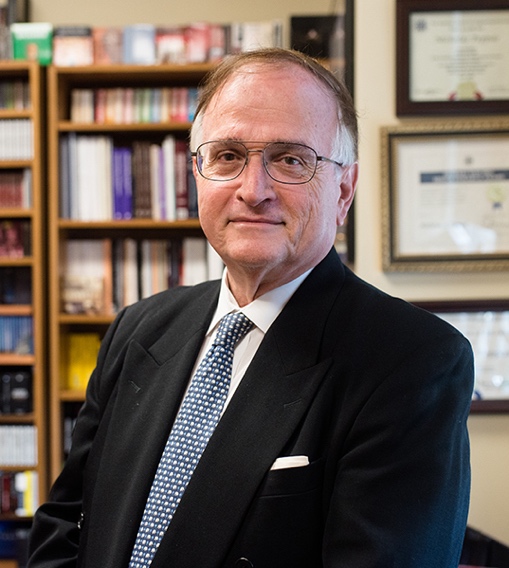
搜索网站、位置和人员

新闻与活动 活动信息
西湖云谷论坛第9期 | Nicholas A. Peppas: Frontiers of Biomaterials: Biomimetic Hydrogels for Advanced Recognition, Cell Binding and Therapeutic Delivery
时间
2024年7月16日(周二)
10:00-11:30, Tuesday, July 16, 2024
地点
E10-205, Yungu Campus, Westlake University
主持
Jian Yang, Chair Professor, School of Engineering, Westlake University
受众
全体师生
分类
学术与研究
西湖云谷论坛第9期 | Nicholas A. Peppas: Frontiers of Biomaterials: Biomimetic Hydrogels for Advanced Recognition, Cell Binding and Therapeutic Delivery
Time: 10:00-11:30, Tuesday, July 16, 2024
Venue: E10-205, Yungu Campus, Westlake University
Host: Jian Yang, Chair Professor, School of Engineering, Westlake University
Language: English
Speaker:

Prof. Nicholas A. Peppas
Cockrell Family Regents Chair in Engineering,
Departments of Biomedical Engineering and Chemical Engineering, Departments of Pediatrics and Surgery, Dell Medical School, and Division of Molecular Pharmaceutics and Drug Delivery, College of Pharmacy
Director, Institute for Biomaterials, Drug Delivery and Regenerative Medicine,
The University of Texas at Austin
Biography:
Professor Nicholas A. Peppas is a biomedical/chemical engineer, materials scientist, and nanotechnologist whose research contributions, innovations, inventions have led to twenty chemical, medical and pharmaceutical products. Peppas is an elected member of the US-National Academy of Engineering, Academy of Medicine, American Academy of Arts and Sciences, Academy of Inventors, Academia Europaea, Canadian Engineering Academy, Indian National Engineering Academy, Chinese Academy of Engineering, Korean Academy of Science Technology, National Academy of France, Royal Academy of Spain, Academy of Athens, Greece, Academy of Romanian Scientists, Mexican Academy of Sciences, Academy of Texas, Royal Society of Chemistry (UK) and Italian Society for Medical And Biological Sciences.
He has served as a Visiting Professor in the Universities of Geneva, Paris-Sud, Santiago de Compostela, Madrid, Lisbon, Parma, Pavia, Napoli, Hacettepe/Ankara, Athens, Berlin, Hebrew University/Jerusalem, Hoshi University/Tokyo, Nanyang University/Singapore, Sichuan University, Peking Medical College. Peppas is a distinguished professor in Chemical Engineering, Biomedical Engineering, Pediatrics, Surgery and Pharmacy, and a member of the Texas Materials Institute at the University of Texas at Austin.
His group has set the fundamentals of flow and transport phenomena in numerous medical problems, based on the principles of engineering science and biology. He has numerous books, 1,850 publications and is cited in more than 216,000 references (H=212). Honored by 190 Awards including NAE Founders Award, NAM Adam Yarmolinsky, Pharmaceutical Global Leader Award, and the Biomaterials Global Impact Awards.
Peppas holds a D.Eng. from NTU Athens, a ScD. from MIT and is the recipient of 13 honorary doctorates and professorships from France, Spain, Italy, Belgium, Greece, Slovenia, Romania, Israel and China. He is the Editor of Regenerative Biomaterials (Oxford) and Past-President on the International Sigma Xi research organization.
Abstract:
The biomaterials world is changing drastically. New chemistries have created many exciting new materials. Engineering the molecular design of intelligent biomaterials by controlling structure, recognition and specificity is the first step in coordinating and duplicating complex biological and physiological processes. Recent developments in siRNA and protein delivery have been directed towards the preparation of targeted formulations for protein delivery to specific sites, use of environmentally-responsive polymers to achieve pH- or temperature-triggered delivery, usually in modulated mode, and improvement of the behavior of their mucoadhesive behavior and cell recognition. We address design and synthesis characteristics of novel crosslinked networks capable of protein release as well as artificial molecular structures capable of specific molecular recognition of biological molecules. Molecular imprinting and micro-imprinting techniques, which create stereo-specific three-dimensional binding cavities based on a biological compound of interest, can lead to preparation of biomimetic materials for intelligent drug delivery, drug targeting, and tissue engineering.
We have been successful in synthesizing novel glucose- and protein-binding molecules based on non-covalent directed interactions formed via molecular imprinting techniques within aqueous media. We have also developed structurally superior materials to serve as effective carriers for siRNA delivery to combat Crohn disease and ulcerative colitis.
Contact:
Ms. Linh Chu, School of Engineering
chuyenlinh@westlake.edu.cn

















